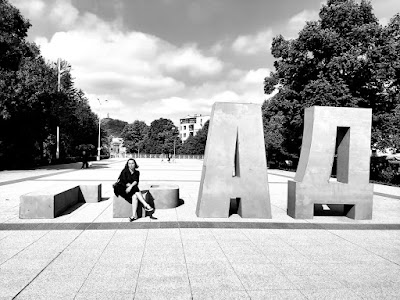Veronika Tzekova
„грАД“
(en. град - city; АД - HELL)
large format typographic installation/sculpture
(3 m x 10 m x 60 cm)
Plovdiv, Bulgaria
2022
„грАД“ looks at the language through the lens of the Set theory and uses the visual perception of the written text. In Bulgarian “град“ means “city”, and the second half of the word is “ад“, which means “hell”. „грАД“ is a scenario of only two words, but it tells the stories of many cities and countless human destinies.
It seems as if in an imaginary past „грАД“ was conceived and installed as a massive and imposing monument to the city. The city as an institution. The city as the centre of human civilization, prosperity and culture. The city as a dream and an object of desire. The city as a powerful attraction. In the present, the viewer witnesses the result of how time, natural forces, and perhaps most of all, the human factor have taken away the city's grandeur and charm, and turned it into an inferno. "Г" and "Р" have replaced their proud monumental vertical position with a horizontal one. They have turned into a kind of ruin, resting in the dust of the street and can be mistaken for a non-standard type of urban furniture. "АД" becomes a city landmark, oppressive with its size and warning with its brevity.
„грАД“ visualizes the duality of the city - a continuous cycle and dynamic between the city as an object and source of desire and the burden of the urban reality and everyday life. „грАД“ is a process in which we, tired but unfailingly motivated, are seeking balance in the midst of chaos and randomness.
„грАД“ was installed 3 – 12 September 2022, in a central location in the city of Plovdiv, Bulgaria as part of the Week of Contemporary Art. Not planned, but expected, it turned into interactive typographical installation. Daily differed meanings were created: град - city; гад – badass; ад – hell and in the day of the deinstallation only “A” was standing, A? (en. Huh?) or A! (en. Eh!).




No comments:
Post a Comment